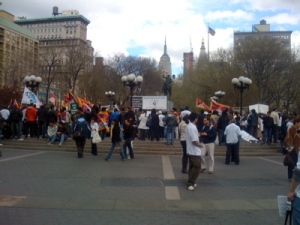In April 1968, when Mark Rudd and other students took over the halls of Columbia University, I was 12 years old – too young for anything other than hero-worship. So I read the newspaper accounts, watched the news on television, and wrote in magic marker all over my bedroom walls.
I carefully drew peace signs, Rudd’s name, and “Columbia” from the closet at one end of the room’s longest wall to the rear window at the other end. And the word “Love,” scrawled Peter-Max style – big balloon sans-serif letters that overlapped one another, with the “O” being yet another peace symbol. I don’t remember asking my parents about writing all over my walls, and I do remember my mother’s odd smile when I showed her my handiwork.
That year students took over college campuses from Berkeley to Bonn. They drew their energy from the Civil Rights protests that ended Jim Crow and the antiwar demonstrations that ended Lyndon Johnson’s reelection campaign.
Where did that energy go? Where are the protest movements of today? As it turns out, there’s still plenty of energy, and still plenty of protest. What’s missing is the reporting of it. Consider Human Rights Torch Relay, a world-wide ongoing protest that has taken the traditional Olympic torch relay as an occasion for repeated protest of China’s subjugation of Tibet. Yesterday, Reuters published a nice timeline or their protests, beginning with the March 24th Athens torch lighting, and continuing, among other places, in San Francisco, Paris, Bangkok, and, last Sunday, South Korea.
Indeed, the print media has done a pretty good job of covering Human Rights Torch Relay. But where are the television networks? A google search looks in vain for them until the 48th link, where a story by CNN is the first network-based one to appear.
And even if the big wire services such as Reuters, AP, and AFP can cover a big protest like Human Rights Torch Relay, they fall down when it comes to smaller ones. Did you know about a protest at Penn State that has lasted more than two weeks now? They are “demanding improved conditions in the factories where Penn State apparel is made.” Nor has Penn State been the only anti-sweatshop rally in recent weeks; there have been at least three others.
I learned about them at a new blog, http://studentactivism.net/, that hopes to provide a focal point for “News and analysis on student organizing, student activism, and students’ rights.” The blog, which launched yesterday, is maintained by Angus Johnston, whose goal is to fill the middle ground between the mainstream media, which doesn’t cover smaller activist efforts, and student networks, which largely preach to the choir.
Students provided much of the early white support for black civil rights activism, they spearheaded the anti-Vietnam movement, and they’ve never stopped being in the forefront of protest, whether it’s over environmental issues, Nicaragua, corporate responsibility, the death penalty, or the war in Iraq. Whether we agree or disagree with the stances that students take (and they’re by no means all of one mind in their concerns), I hope that many of us will subscribe and link to the site, as I now have.
